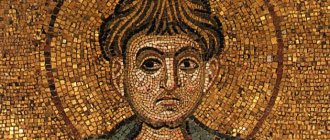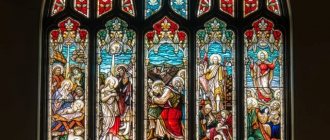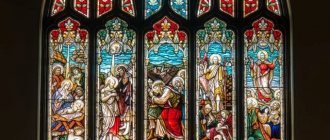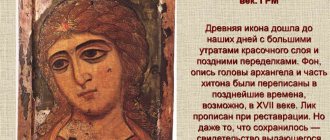Translation:
The angel proclaimed to the Blessed One: “Pure Virgin, rejoice! And I will say again: Rejoice! Your Son rose on the third day from the grave and raised the dead.” People, rejoice!
Shine, shine, new Jerusalem - the glory of the Lord has risen above you! Rejoice now and show off, O Zion! Rejoice, Pure Mother of God, about the resurrection of the One born of You.
Crying - shouted; paki—again; tridneven - on the third day; raised up - resurrected; show off - rejoice; uprising - resurrection; Your Nativity - Born of You
BACK (To previous page)PREVIOUS PRAYER
End of prayers
It is worthy to eat as you truly bless Thee, the Mother of God, the Ever-Blessed and Most Immaculate and the Mother of our God. We magnify You, the most honorable Cherub and the most glorious without comparison Seraphim, who gave birth to God the Word without corruption, the real Mother of God.
Worthy to eat
- should, must.
As truly
- truly, in justice (
as
- as).
Bless
- to praise.
Ever-blessed
- always blessed (
ever-blessed
- always).
Most immaculate
- the most immaculate, completely sinless.
The most honorable Cherub
- worthy of greater honor than the Cherubs.
The most glorious Seraphim without comparison
- deserving incomparably greater glorification than the Seraphim.
Without decay
- without violating purity.
Existing
- real.
Cherubim
(in Hebrew this word means “outpouring of wisdom”) and
Seraphim
(“flaming ones”) - the highest Angels closest to God.
+
The second half of the prayer -
“The most honorable Cherub...”
(it is still used independently in worship) - was composed in the 8th century by Saint Cosmas, Bishop of Maium... According to legend, this song was composed by him on Good Friday, a particularly mournful day for the Mother of God .
After this, the Most Holy Theotokos appeared to the monk and with a joyful face said: “Your songs are pleasant to Me, but this one is more pleasant than all the others; I am pleased with those who sing spiritual songs, but I am never so close to them as when they sing this new song of yours.” The words of the Most Honest Cherub
go back to the laudatory words of the Mother of God of Ephraim the Syrian: “The most honorable of the Cherubim, incomparable before all the heavenly armies...”
In the 10th century, this song chosen by the Mother of God received an even more miraculous beginning.
In one of the monasteries of Holy Mount Athos, a novice prayed in his cell. There was a knock on the door, an unfamiliar, beautiful-looking monk entered and joined in the chant. When the Athonite novice was about to begin the glorification of the Mother of God “Most Honorable Cherubs...”, the guest stopped him and sang another, unknown beginning: “It is worthy to eat as truly the blessedness of You, the Mother of God, the Ever-Blessed and Most Immaculate and Mother of our God,” and already to these hitherto unknown, he added the ending to the words: “The most honorable Cherub.”
The Athonite monk was touched by the wondrous words and the sounds of the angelic voice, and began to ask the stranger monk to write him the beginning of the cherished song. But in the cell there was neither parchment (on which they wrote before the invention of paper) nor ink. Then the guest asked to bring a stone slab and with the end of his finger he wrote the words he sang on the slab. Handing the slab to the astonished monk, he said: “From now on, always sing like this, both you and all Orthodox Christians,” and became invisible. Then the monk realized that an Angel of God had visited him.
Since then, this amazing prayer has remained in the Church, in which the angelic song was added to the inspired human creation: since 980, according to the conciliar definition of the Church, the chant began to be sung in a new, complete edition.
Note. From Easter to Ascension, instead of this prayer, the chorus and irmos of the 9th song of the Easter canon are read:
The angel cried out with grace: Pure Virgin, rejoice! And again the river: Rejoice! Your Son is risen three days from the grave, and raised up the dead; people, have fun!
Shine, shine, new Jerusalem, for the glory of the Lord is upon you. Rejoice now and be glad, O Zion; You, Pure One, show off, O Mother of God, about the rising of Your Nativity.
This remark also applies to future bedtime prayers.
Glory, and now: Lord, have mercy.
(Three times)
Lord Jesus Christ, Son of God, prayers for the sake of Your Most Pure Mother, our reverend and God-bearing fathers and all saints, have mercy on us, Amen.
PREVIOUS PRAYER
BACK (To previous page)
The Angel cries out for Grace...
The angel cried out with the Most Grace: Pure Virgin, rejoice, and again the river, rejoice: Your Son is risenHe is three days old from the grave, and raised up the dead; people have fun!The joy of the holiday of the Bright Resurrection of Christ, anticipated to a greater or lesser extent by each of us long before its onset, on the very day of Holy Easter takes over our entire being so strongly and makes our hearts feel so vividly that we, apparently, have completely stopped This is the time to live with the other powers of your soul. Being present at Easter Matins in a festively decorated church, seeing the priests dressed in shiny, expensive clothes, and the rejoicing people around us, we hear the words of solemn sacred chants and at the same time, as if we are not listening to them. The feeling that covers us at the same time is so strong and pleasant that we only think about how to prolong it or not disturb it in any way. Our reason temporarily renounces its legal rights and gives way to one pure, genuine joy: such is the power of living direct impressions, which, starting from early childhood, gives us every time this appointed and holy day...
And as the Holy Days of Paschal Week pass, quiet sadness creeps into the heart of the believer; he feels sorry for his past, the only one of its kind, high pleasure: he would even like to return the holiday itself. He involuntarily begins to reproduce the Easter service that he had not heard at one time, recalls its sacred hymns separately and tries to penetrate into their inner meaning. The reason that has been silent for a while awakens in him and strives to elevate the experienced feeling of the Life-Giving Resurrection of Christ to the level of completely conscious and sober understanding.
Not everyone and not everything from the Easter service becomes clear and understandable. Which Orthodox Christian does not know by heart, for example, the chorus to the ninth song of the Easter canon, The Angel Crying with Grace?
Which of us, following the clergy, does not sing it, if not with our lips in a low voice, then with our hearts?
And yet, is everyone able to understand and correctly interpret its hidden meaning? No one, without a doubt, will have any difficulty in saying that in the first half of the chorus the songwriter is talking about the Annunciation and has in mind the words: Rejoice, full of grace: the Lord is with you, blessed are you among women
(Luke 1:28), with which you greeted the Blessed Virgin Mary the heavenly Messenger sent to announce to Her the secret of the incarnation of the Son of God from Her.
But what is said further in the song that interests us? In view of the grammatical connection of the second half of the chorus with the first ( and again
)
,
it is very easy to think that the greeting of the same Archangel Gabriel is still being reproduced, but only addressed to the Mother of God already on the morning of the day of the Resurrection of Christ. This is what many scientists and even authoritative persons think, not to mention simple, unlearned people. Revealing the idea that it was the Angel, and not anyone else, who was ordered to tell the Mother of God the first joyful news about the rise of Her Son from the tomb, the latter refer specifically to the words of the chorus of the ninth song of the Paschal Canon that we are examining. This reference seems to us to be a matter of misunderstanding, but the idea it confirms agrees with pious, time-honored tradition.
Nowhere in Holy Scripture is it said about the appearance of an Angel to the Most Holy Theotokos with the news of the Resurrection of Christ; There is no mention in it of those that the Mother of God saw Her risen Son first of all. Meanwhile, to whom else could the primary joy of the Resurrection of the Lord belong, if not She Who was most worthy of all to receive it? The Mother of God was the closest of all earthly beings to Jesus Christ, and Her heart, more than others, was struck with inexpressible sorrow at the sight of the suffering and death of the Lord. Seeing the torment of His Mother from the Cross, the Lord, in tender filial care for Her, in the dying moments entrusted Her to the care of His beloved disciple. Is it possible to allow this extraordinary Son of an extraordinary Mother to forget about Her at the time when the hour of His glory came, when He appeared on earth as the Conqueror of death and hell? Is it possible to think that He would have wanted to prolong the suffering of She from Whom He took His flesh, Who lived by Him, and whose heart, pierced by a weapon at the Crucifixion of the Son and Lord, was most in need of consolation? That is why, despite all the silence of the Evangelists, you willingly agree with Saint Gregory Palamas that the Mother of God, first of all, as it should have been, learned from the Archangel Gabriel about the Resurrection of Her Son, that She was the first of earthly beings worthy of not only beholding the risen Savior and conversing with Him , but also to touch His most pure feet. In the Jerusalem Church of the Resurrection, not far from the Holy Sepulcher, they still show the place of the appearance of the Risen Mother, and the Holy Church repeatedly returns to this event in her Easter hymns: having seen Your Son risen and God, rejoice with the Apostles, O God-gracious One. Clean; and rejoice first, for you have received all the joys of Wine, O Mother of God, All-Immaculate... God, Whom you gave birth to in the flesh, from the dead, as you said, having risen and seen, Pure, rejoice... -
in these and similar expressions she recalls the appearance of the risen Savior to the Mother of God. All this, of course, is so; the tradition of the appearance of an Angel with the good news of the Resurrection and of the Risen Mother of God Himself, illuminated by centuries, must be based on an undoubted event.
But, however, this is not the event that the songwriter had in mind in the second half of the chorus to the ninth song of the Easter Canon. He did not refer to the Angel, who preached to the Mother of God about the Resurrection of Christ, the words: and again the river, rejoice: Your Son is risen three days from the grave, and having raised the dead, people, rejoice.
He spoke them on his own behalf.
It was quite natural for the compiler and singer of these words to call on the Mother of God, and after Her and all people - the entire Church to Spiritual joy and gladness, but the Angel who announced to the Mother of God about the rise of Her Son from the Tomb, late at night or early in the morning, at the tomb of the Risen One , there was no visible reason to add to your gospel the words, people, rejoice,
for there was no one to invite to rejoice in front of the grieving Mother of God.
So, the internal meaning of the chorus in question, as it is set out in Slavic liturgical books and sung by us now, should be as follows: Angel
(at the moments of the Annunciation)
he cried out to the Blessed One: Pure Virgin, rejoice!
And I (the Creator of the song)
will say again, rejoice: Your Son rose three days from the grave, having raised the dead, rejoice, people!
That this is precisely the true meaning is partly evidenced by other choruses to the same ninth song of the Easter Canon. For example: Rejoice, Virgin, rejoice, Blessed One, rejoice, Most Glorified One: Your Son is risen three days from the grave.
Just as in these words the songwriter speaks to the Mother of God on his own behalf, so he did in the second half of the chorus:
The Angel cries out to the Most Blessed...
Alexander Petrovich Golubtsov
“The Angel Cries” - Dmitry Stepanovich Bortnyansky
Description of the work.
“The Angel Cries” is a spiritual work by D.S. Bortnyansky, dating back to the Easter period. The work is performed at the Divine Liturgy and replaces the usual hymn of praise to the Mother of God “It is Worthy to Eat.” The work is based on laudatory texts from the Holy Scriptures, as well as testimonies about the Resurrection of Christ.
The character of this hymn of praise to the Mother of God is solemn, filling the worshipers with quiet joy. The style of the composition is strict, devoid of elaborate decorations; the main role is given to the skill of the singers, who are able to “illuminate” it from the inside. Otherwise, the author's intention risks being misunderstood by listeners.
History of creation.
The Easter period occupies a central place in the creative heritage of D.S. Bortnyasky, because as director of the Court Singing Chapel he was responsible for the musical component of services in the palace Church.
“The Angel Cries” is written in such a way that it can be successfully performed as a spiritual concert, and also harmonizes perfectly with the works of other church authors when performed at the Divine Liturgy. Nowadays, one can increasingly hear this composition at Church and secular festivals of sacred and ancient music, which indicates the growing popularity and interest in the work of D.S. Bortnyansky.
The author's attitude towards faith.
It is known that D.S. Bortnyansky was born into a Cossack family and at an early age was selected to study at the Cossack singing school in the city of Glukhov. There, little Dmitry, who naturally had a beautiful voice, began singing in a church choir, and at the age of seven he went to St. Petersburg, the capital of the Russian Empire, to continue his studies and participate in divine services as part of the court singing choir. Thus, from a young age, love for God was nurtured in the boy’s soul, and Orthodox traditions of piety took root. Subsequently, having continued his studies in Italy and gained experience and knowledge, Dmitry Stepanovich will take the post of director of the chapel and become a reformer, savior and innovator of Russian church singing. His God-given talents will be fully revealed, but he will receive even greater recognition for his precious spiritual qualities - modesty, kindness, willingness to help and sympathize. He will invest his savings in preparing for the publication of works for liturgical use - these included his personal works and revised works of Italian authors. And on the day of death he will call the choir singers, and to the singing of his composition “Thou art sorrowful, my soul,” he will peacefully depart to the Lord.
Biography.
The life of D.S. Bortnyansky is inextricably linked with Russian church singing. He was born on October 28, 1751 in the city of Glukhov, which was then the capital of the hetmans and had excellent conditions for primary education - the boy learned the basics of church singing at a local school. Almost nothing is known about Dmitry’s parents, perhaps because the composer himself, after moving to the capital at the age of seven, never saw them again. The talented boy was noticed by the then director of the Court Singing Chapel, a prominent Italian composer of the Venetian school, Baldassare Galuppi. He succeeded in sending seventeen-year-old Dmitry Bortnyansky to study in Italy with an allowance for him. The budding composer chose Venice as a place for his musical improvement due to the presence of an opera house there and the active musical life of the city. The internship was so successful that Dmitry's operas were staged in Venice, and he also wrote a number of works, including cantatas and other church works.
In 1779, at the age of 28, Dmitry Stepanovich returned to the Russian Empire as a titled European composer - he was immediately appointed to the position of director of the Court Singing Chapel and teacher in it. It was responsible and honorable. The composer undertook a serious reform of the institution - in addition to increasing the composition of the choir, he managed to achieve the abolition of the participation of singers in secular concerts and the main responsibility of the group to make the performance of church music.
Dmitry Stepanovich took on a lot of work - he edited all the works previously written by Italian composers, mercilessly eradicating inappropriate embellishment and operatic dramaturgy unusual for it from sacred music. The chapel's repertoire is now being updated, including many new works by the young composer. It is worth adding that Dmitry Stepanovich wrote his compositions taking into account the characteristics of singing voices, so they always sounded great, without tiring either the performers or the listeners.
In 1816, by decree of Emperor Alexander I, D.S. Bortnyansky became the main censor of sacred music of the Russian Empire, which undoubtedly had a positive impact on the quality of church singing.
He left behind a huge musical heritage, including operas, secular vocal and instrumental works, but he considered the main work of his life to be a collection of spiritual works performed by the Court Chapel, under his editorship. This monumental work in ten volumes was published in 1882 through the efforts of P.I. Tchaikovsky.
D.S. Bortnyansky peacefully reposed in the Lord on September 27, 1825, while singing one of his spiritual concerts. His reforms forever changed the path of Russian church music, opening up wide areas of development and improvement for it and preserving its originality. The composer’s works became state and national anthems, as was the case with “Kol Slaven” and “Singer in the Camp of Russian Warriors,” which raised morale during the Patriotic War of 1812. Today Bortnyansky is known and loved all over the world, and the best characteristics of his works are given by eyewitnesses:
“Count Andrei Kirillovich Razumovsky, who was the ambassador in Vienna, had his own singers... They studied in Russia with Bortnyansky... Truly, I have not heard such sweet harmony for a long time: what gentle voices! What music!" —
Prince I.M. Dolgoruky
“...they began to sing one of Bortnyansky’s extensive eight-voice concertos. In this harmonic fabric one could hear such interweaving of voices that seemed something incredible; sighs and some vague gentle sounds were heard, similar to sounds that one might dream; From time to time, intonations were heard, in their intensity reminiscent of a cry from the soul, capable of piercing the heart...”
Hector Berlioz
Author of the text: Vetkina Anastasia Aleksandrovna.
Text.
The angel cried out with grace: Pure Virgin, rejoice, and again the river: Rejoice! Your Son is risen three days from the grave and raised up the dead: people rejoice.
Shine, shine, New Jerusalem, for the glory of the Lord is upon You. Rejoice now and be glad, O Zion. You, Pure One, show off, O Mother of God, about the rise of Your Nativity.
The angel proclaimed to the Blessed One: Pure Virgin, rejoice! And I will say again: Rejoice! Your Son rose on the third day from the grave and raised the dead. People, rejoice!
Shine, shine, new Jerusalem - the glory of the Lord has risen above you! Rejoice now and show off, O Zion! Rejoice, Pure Mother of God, about the resurrection of the One born of You.









